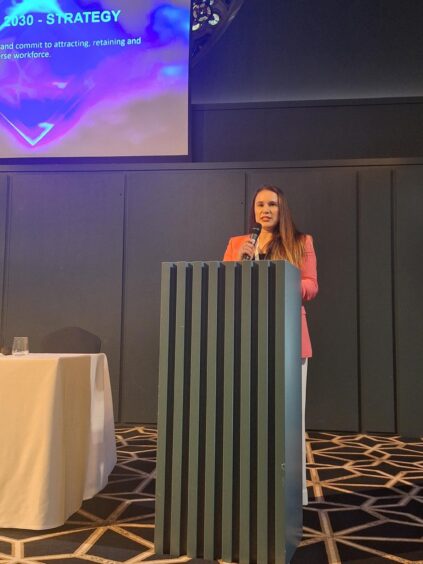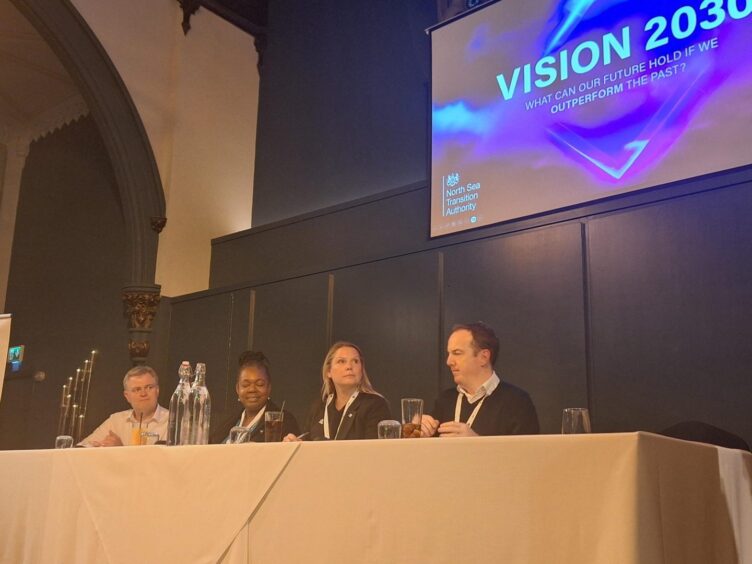Seven initiatives to help energy industry businesses increase the diversity of their workforce were unveiled at an event in Aberdeen.
Axis Network, a volunteer-run group campaigning to achieve gender equity in the energy sector, revealed the list of strategies as part of their Vision 2030 mission which was welcomed by a panel of industry leaders.
Presenting the aims to an industry audience, Axis co-chair Emma Behjat, who is also a technical sales manager for Wood, said: “We truly believe that equity and inclusivity will drive a better future for the energy industry and all who work within it.
“This is not just about women. These changes will benefit everybody.
“We can see that we are at a pivotal point of the energy transition and if we make these changes now we know we will have the greatest impact.”
Achieving gender equity by 2030 is an aim shared by the United Nations and formalised as a sustainable development goal.
She added: “Evidence shows that companies that are more inclusive are more likely to make better, bolder decisions and find new ways of working. It has been declared that if you have diverse teams you are more likely to radically innovate and that’s what we need in the transition.”
She also pointed to research which showed that a 5% increase in the number of women working in the energy industry could increase GDP by up to £125billion per year.
“Imagine an industry where our workforce are thriving with one of the lowest absentee rates possible.
“Imagine an industry where people competed to work here because our work life balance was second to none.
“Imagine an industry where parents and carers were respected for taking leave.
“Imagine an industry where leaders were measured on the diversity of their teams and how inclusive their companies were.
“Imaging an industry that was held up as a world class example of what others should achieve.
“This is what we should be aspiring for.”
The strategy was discussed by a panel that featured Claire Mack, chief executive of Scottish Renewables; David Whitehouse, the chief executive of Offshore Energies UK (OEUK), Myrtle Dawes, the chief executive of the Net Zero Technology Centre (NZTC) and Stuart Payne, the chief executive of the North Sea Transition Authority (NSTA).
Whitehouse, who leads the offshore industry’s trade body, said the energy sector won’t achieve its aims “unless we take this seriously, unless we absolutely are making an effort to make sure that by 2030 it feels like a truly inclusive place”.
Mack said the industry was playing a “numbers game” and needed to attract as many workers as possible.
“If we get to 2030 and deliver what we are looking to deliver, we will have succeeded in being diverse and inclusive, because we can’t do it unless we are.
“Being able to attract and retain everybody that we need as a sector means we have to be open and visible and attractive.”
Dawes said diversity also meant including older workers which would require employers should offer more flexibility. She said the road to equity would be “bumpy” but as the UK continued on a path to energy transition and net zero it would have to offer a global standard. “We need to get to a stage where we can be working really collaboratively and with equity with the rest of the world.”
Payne, who has been an increasingly vocal advocate of inclusivity in the workplace, said employers needed to tackle cultures where “people are exposed to short-term, selfish, unkind, crass, clumsy and consequence-free incidents” which he added are “statistically often led by men”.
He said the industry regulator had achieved a leadership team which has a majority of women and a gender-balanced board but not through setting targets.
Instead, the organisation is focused on creating an attractive environment for “cool” people – 50% of which would be women. “The outcome is wanting a place where everyone can bring their whole self to work and that is an addictive, contagious feeling.”
He added: “Not one of those people on the board or the leadership team of the organisation, either male or female, thinks they were selected on the grounds of gender. Which means they know they got their job because we thought they were the coolest person for the job. How great is that?”
1. Join the Axis pledge committing to attract and retain a diverse workforce
2. To have inclusion valued as a core leadership trait, with value placed on nurturing business where diversity thrives
3. Toe have transparent promotion and performance models which tackle hidden and underlying biases, ensuring they are applied fairly across the business
4. Sponsor men and women equally, promoting the skills of a diverse range of individuals for consideration in new opportunities.
5. Flexible working for all, regardless of who, what or why it is needed, recognising the advantage of an engaged and supported workforce
6. Equal parenting policies, bringing paternity leave in line with maternity leave and encouraging uptake.
7. Returnerships, encouraging and facilitating those that left the industry for caring, ill health or other reasons, to return.
Recommended for you



 © Erikka Askeland/DCT Media
© Erikka Askeland/DCT Media © Erikka Askeland/DCT Media
© Erikka Askeland/DCT Media






